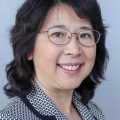lihualiu@usc.edu / (323) 442-1636 / SSB 305E
1996 Ph.D., Demography/Medical Sociology, University of Southern California
1987 M.S., Applied Demography, University of Southern California
1985 B.S., Population Science, People’s (Renmin) University of China, Beijing, China
Lihua Liu, Ph.D., is Associate Professor of Population and Public Health Sciences at the Keck School of Medicine of USC and of Spatial Sciences with the Spatial Sciences Institute at the USC Dornsife College of Letters, Arts and Sciences. She is the director and principal investigator of the USC Cancer Surveillance Program, responsible for recording all cancer diagnoses in Los Angeles County. She also is the founder and co-director of the USC Immigrant Health Initiative.
Trained in demography and medical sociology, Dr. Liu finds that cancer surveillance research unifies her interests in both population and health. Fascinated by the dramatic variations in cancer risk among different population groups, not only globally but also regionally and locally, Dr. Liu has been conducting research that integrates the sociodemographic factors into the legally mandated cancer surveillance data to describe and reveal the disparities in cancer-specific risk patterns and trends among the racially/ethnically and socioeconomically diverse populations in the United States. She has developed extensive knowledge of and contributed significantly to cancer surveillance research in California and nationwide. She also participates and coordinates various projects organized by the International Agency for Research on Cancer (IARC) of the World Health Organization and the International Association of Cancer Registries (IACR).
As an immigrant herself, Dr. Liu has paid special attention to the observed changing cancer risks among immigrant Americans and the implications of lifestyle changes on cancer development. Her growing interest in immigrant health will focus on understanding the spatial distribution and cultural influences of immigrant communities on health outcomes. She believes the best way to engage immigrants in social integration begins with health promotion and disease prevention activities.
Her ultimate research goal is to capitalize on the diverse cultural assets of immigrant Americans to build a new American culture of health to benefit all Americans.



